The progressive development of patient and public involvement (PPI) in healthcare and health research reflects a shift to working “with” patients rather than for them and its benefits are increasingly being documented and promoted [1–4]. There is however, little information on training programmes for patients seeking to take on leading roles in healthcare and health research. We set up a training scheme for patients jointly with Grenoble Patients’ University, the Centre Hospitalier Universitaire Grenoble Alpes—a university hospital, and the Medical and Pharmacy Schools at Université Grenoble Alpes.
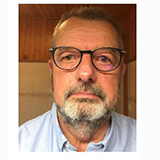 Raymond Merle, founder of the Grenoble Patients’ University, expert patient, PhD student
Raymond Merle, founder of the Grenoble Patients’ University, expert patient, PhD student
In October 2014, together with five fellow patients, I set up the Grenoble Patients’ University (GPU) as an independent charitable association. I have had chronic kidney disease for more than 30 years, and have undergone both long term dialysis and renal transplantation. This has given me considerable insight into the status and roles played by patients in health systems. I was keen to use this insight to support, inform, and train fellow patients. I started by enrolling as a student at the University of Patients in Paris, which is linked to the Sorbonne University, where I did a masters in education for health in 2010-2011. I followed this by taking a masters in engineering for health in 2012-2013 at the University Grenoble Alpes (UGA) in Grenoble. After completing these two masters, I decided to found the Patients’ University of Grenoble. The main objective was setting up a co-produced training programme for patients led by patients with expertise from their own lived experience, and health professionals from the university and university hospital. The initial aim of the Grenoble Patients’ University was to train patients to teach others patients to self-manage their conditions better and to participate in research. The course was opened to patients and carers. Another key aim of the university is to support and empower patients on a social level through their role as educators and thorough active participation in patient organisations and charities.
The difference between The Grenoble Patients’ University and the patients’ universities in Paris and Marseilles lies mainly in the fact that our courses are co-produced by patients in collaboration with professionals. Patients take on the role of teachers, which for many involves a long term commitment to the university and those who undergo training.
How the co-produced training course was set up and implemented
The first step was establishing a joint education committee. This was made up of expert patients, members from the medical education faculty of UGA, a unit dedicated to patient education in the Centre Hospitalier Universitaire Grenoble Alpes (CHUGA), a French association for the promotion of patient education, an association dedicated to patients with liver diseases, and a centre organising and promoting occupations dedicated to mental health. All these associations were very active within this joint education committee and some are faculty members of the GUP.
The financial resources mostly came from the patients’ associations and the regional health authority in Auvergne Rhone Alpes. Patients who enrolled on the initial training programmes were not charged any fees. Teaching was organised over eight to 11 days plus two days of internship during which students took on personal projects conducted over a period of up to six months. From the end of 2015 to the end of 2017, we focused on delivering and assessing the five training sessions.
The objectives of the first programme were: firstly to discover methods to educate and empower patients with chronic long term conditions to be proactive about self-managing their own health. Secondly to promote and support PPI and patient advocacy work in different settings, including medicines regulation and development, undergraduate and continuous medical education programmes, and in public institutions such as hospitals, universities, and public health agencies, and patient associations
The objectives of the mental health training programme were to acquire skills as active listeners, enablers of peer support initiatives, and carers in collaborative projects and mental health networks.
Teaching was conducted in both plenary and small group sessions. Participants were required to take part in all courses and undergo an “internship” in the form of a presentation of a PPI project to a multi-professional faculty team including expert patients, carers, doctors from CHUGA/UGA, and trainers from patient associations.
Patients were invited or referred to join training programmes via patients’ associations or their health professionals. The criteria for accepting them onto the course included a commitment to help other patients. Each underwent a joint interview by patients and a doctor if needed, prior to being accepted onto the programme. No academic qualifications were required. The key requirement was their own experience in health and social care.
Everyone on the course was taught how the French health system works and what patients’ rights and obligations are. They were also taught the principles of good communication, and the roles that patients and carers play in health systems and research. Faculty used slide shows, publications, and multiple exchanges. The resources provided for the course are shown on the University’s website and will appear on a dedicated website in March 2021.
How the Grenoble patient training programme differs from others set up for patients
The main way in which the course is original compared to others lies in the fact that it’s a truly collaborative co run training programme set up between a patient organisation, the Grenoble Patients’ University, and a university medical school. The affiliated hospital aims to promote active PPI and leadership in all facets of healthcare and health research. The GPU aims to achieve some of the objectives promoted by InHealthASSOCIATES who are experts in patient and public engagement, co-production, and patient-leadership. The European Patients’ Academy on Therapeutic Innovation (EUPATI) training courses mainly aim to promote patients’ contributions in medicines research. While the European Patient Ambassador Programme (EPAP) is also a broad one; it is essentially a self-learning programme introducing patients and carers to the basic essential skills and knowledge needed to interact with healthcare professionals, policymakers, researchers, and journalists. To facilitate joint learning we plan to forge links with these bodies. to link. We are also committed to advancing the role of patients as educators which is at last beginning to gain momentum in France and internationally. [2,3,4]
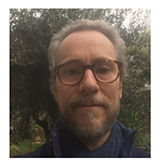 Géraud Paillot, president of Anterior Multiple Sclerosis association in Rhône Alpes
Géraud Paillot, president of Anterior Multiple Sclerosis association in Rhône Alpes
I applied for the patient training course to extend my knowledge and skills as a patient advocate. I found the course informative and stimulating and it was valuable to acquire skills in facilitating and preparing workshops for fellow patients and learning how to work in a multidisciplinary team. This in turn motivated and empowered me to work with the neurology teams at Grenoble University Hospital to set up programmes of therapeutic education for patients with multiple sclerosis (MS). On a personal level, I have found that the training has helped me to take a step back from my own MS focusing on recognising and taking steps to meet the needs of other patients like me.
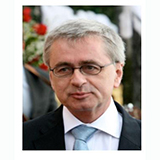 Christophe Pison, former Assessor to the Dean for postgraduate education at School of Medicine within UGA and founder of GPU
Christophe Pison, former Assessor to the Dean for postgraduate education at School of Medicine within UGA and founder of GPU
Thanks to patients that pioneered health democracy such as Raymond Merle, who I met a long time ago as a young resident in nephrology, I progressively discovered the value of alliance with patients to achieve better outcomes, to better deliver care and organize research. At the end, what strikes me the most is that the Grenoble Patients’ University project, and now the Département Universitaire des Patients Grenoble Alpes, actually started thanks to few patients that were able to come together, around values such as autonomy and patient dignity, a large part of the academic and medical health Grenoble Alpes ecosystem. Raymond Merle taught me a lot and now I have the privilege to be his PhD mentor.
The covid-19 epidemic complicated matters. The year 2020 was used to build the department within the University Grenoble Alpes. Nevertheless, we have been able to continue both face-to-face and distance learning courses for various masters’ degrees as well as tutorials with future pharmacists. We are now well primed to set up new courses and new research projects.
Evaluation and impact
In the first two years of the course, 35 patients completed the “Becoming a PPI in Therapeutic Patient Education” course, Ten patients completed the “Becoming a PPI in mental health” course. The age of people enrolled on the courses ranged from 26-71 and nearly two thirds were women. Nearly half had already got some prior experience as patient educators and after completing the course all became actively involved in patient education and research activities. Five students have gone on to take up key roles: one at the local ethical committee for research and four as founders of the new department for training patients which has been set up at the end of 2020 within the Medicine and Pharmacy Schools at UGA.
This training initiative has, however, encountered problems. After the launch of the first two courses it became clear that views on course design and governance differed between the founder patients. A major issue was that some patients did not see it as important to ensure that patients were fully involved at all levels of the teaching programme and in its governance. This led to some of the original founding patients leaving the project. It was a very frustrating time. Fortunately these issues were resolved by most of the patients who underwent the initial training course between 2016 -17 and faculty members from the medical and pharmacy schools.
Over the past year other challenges have emerged, most notably the covid-19 pandemic, but we have used this time to build up the patient teaching department within the University Grenoble Alpes, and continued both face-to-face and distance learning courses for various masters’ degrees as well as tutorials with pharmacists in training.
Grenoble Patients’ University moved from being a patient association to a formal university department “Département Universitaire des Patients Grenoble Alpes” within the Medicine and Pharmacy Schools at the UGA by the end of 2020, led by four patients and two professors, one in medicine, Christophe Pison, and one in pharmacy, Benoit Allenet. We are now well primed to set up new courses and new research projects.
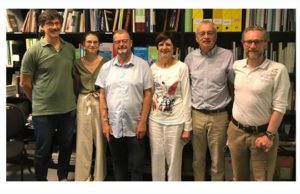 Founders of Département Universitaire des Patients Grenoble Alpes are from left to right Benoit Allenet, Stéphanie Lagasse, Raymond Merle, Géraldine Dall’Aglio Brambilla, Christophe Pison and Géraud Paillot
Founders of Département Universitaire des Patients Grenoble Alpes are from left to right Benoit Allenet, Stéphanie Lagasse, Raymond Merle, Géraldine Dall’Aglio Brambilla, Christophe Pison and Géraud Paillot
This new Département Universitaire des Patients Grenoble Alpes benefits from strong support from Deans of pharmacy and medical schools and key people at UGA and EIT.
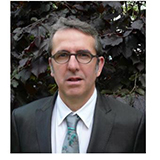 Jean-Louis Pépin, Vice-Dean for Research at Medical School at Grenoble Alpes Université, Director of Research and Invocation Department at CHUGA,
Jean-Louis Pépin, Vice-Dean for Research at Medical School at Grenoble Alpes Université, Director of Research and Invocation Department at CHUGA,
The final goal of a co-creation programme is to bring together key stakeholders, including patients, formal and informal caregivers, to co-design research projects benefiting from skills and tools on patient experience. This cooperation will provide demonstration of accountable research and innovation including reciprocity.
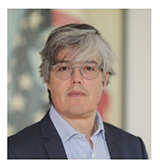 Olivier Palombi, Vice President of Grenoble Alpes Université, Vice-Dean of Medical School, Director of Université Numérique En Santé et Sport, UNESS.
Olivier Palombi, Vice President of Grenoble Alpes Université, Vice-Dean of Medical School, Director of Université Numérique En Santé et Sport, UNESS.
Establishing the GPU in our University has been a collective adventure. It’s the result of the convergence of an innovative vision for our medical school and the persevering action of motivated individuals. PPI is today like evidence to provide a modern health education. But only the first step has been done, we have to continue to turn GPU into an effective partner in a credible and lasting manner.”
 Albane Pariset, Patient and Citizen Engagement Officer European institute of Innovation and Technology, EIT Health France,
Albane Pariset, Patient and Citizen Engagement Officer European institute of Innovation and Technology, EIT Health France,
I am in charge of education programmes at European Institute for Innovation and Technology Health France in France, a community of world leading health innovators backed by the European Union. Our aim is to answer the biggest health challenges Europe faces and we believe that life changing innovation happens when the different worlds meet and collaborate. Extensive work by EIT Health France teams with its partners has resulted in strong processes and activities for citizen and patient participation in all relevant activities, ensuring that the voice of patients is at the centre of all activities and keeping them informed. We work particularly with the University patient training departments in order to put the patient at the heart of innovation projects in the field of health. We follow the work of Raymond Merle and our exchanges are valuable in order to better understand the changing role and place of patients in the healthcare system.
Key messages:
- Successful development and implementation of a co-produced and co-run training programme to promote PPI in health care and health research depends on ensuring a common vision and commitment by patients and health professionals alike to joint planning and governance.
- Training programmes dedicated to empowering and teaching motivated patients to take on lead teaching and training roles for other patients is a good way to realise the objective of meaningful patient and public involvement in health care, health research and medical education.
- Co-led projects which unite different faculties within a university medical and pharmacy school have the potential to enhance understanding and promote joint working between patients, careers and different medical and health disciplines.
Raymond Merle, Jean-Louis Pépin, Olivier Palombi, Albane Pariset, Géraud Paillot, Benoît Allenet, Christophe Pison
Acknowledgements
The pedagogical team included Maud Amolini from the GPU, the Transversal Unit for Therapeutic Patient Education (UTEP), Isabelle Debaty, Sophie Ulhenbusch, the French-speaking Association for the Development of Therapeutic Education (Afdet) Florence Chauvin, the network for prevention, course support and therapeutic education of liver diseases (Prométhée) Edith Enselme and the Centre Ressources Métiers et Compétences en Psychiatrie (CRMC) with Mrs Sylvie Tricardt. Wet are indebted to trained patients who have become trainers Maud Amolini, Nathalie De Bénédittis and Séverine Blanc Durfourd. Géraldine Dall’Aglio Brambilla and Géraud Paillot are thanked for their contribution to the GPU from the beginning, as well as Mrs. Stéphanie Lagasse.
We specially thank John Louis McGregor, PhD, retired Director of Medical Research (DR1) at INSERM, former director of INSERM Unit 331, and retired Honorary Senior Lecturer (research) at the Cardiovascular division King’s College London, for his continuous support.
References:
1 Spencer J, Godolphin W, Karpenko N, et al. Can patients be teachers? Involving patients and service users in healthcare professionals’ education. 2011.https://www.health.org.uk/sites/default/files/CanPatientsBeTeachers.pdf
2 Warner ET, Glasgow RE, Emmons KM, et al. Recruitment and retention of participants in a pragmatic randomized intervention trial at three community health clinics: Results and lessons learned. BMC Public Health 2013;13:192. doi:10.1186/1471-2458-13-192
3 Soutenir et encourager l’engagement des usagers dans les secteurs social, médico-social et sanitaire. Haute Autorité de Santé. https://www.has-sante.fr/jcms/p_3201812/fr/soutenir-et-encourager-l-engagement-des-usagers-dans-les-secteurs-social-medico-social-et-sanitaire (accessed 25 Nov 2020).
4 Dijk SW, Duijzer EJ, Wienold M. Role of active patient involvement in undergraduate medical education: a systematic review. BMJ Open 2020;10:e037217. doi:10.1136/bmjopen-2020-037217
Funding and conflicts of interests: R. Merle is a recipient of a grant from Agir pour les Maladies Chroniques, http://fonds-apmc.org/. Pr. J.-L. Pépin is supported by the ANR (ANR-12-TECS-0010), within the framework of programmes d’investissements d’avenir (ANR-15-IDEX-02). The other authors do not declare any conflicts of interest related to this work. J.-L. Pépin team was funded by EIT health European funding for education projects (CRISH) aiming at co-design with patients and all stakeholders of innovative solutions for health care.
Abbreviations:
CHUGA: Centre Hospitalier Universitaire Grenoble Alpes
EIT Health: European institute for Innovation and Technology Health
GPU: Grenoble Patients’ University
PPI: Patient and Public Involvement or Involved
TPE: Therapeutic Patient Education
UGA: Université Grenoble Alpes
